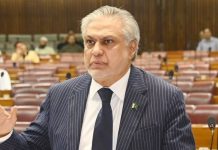ISLAMABAD: The Pakistani rupee sank sharply by Rs18.98 against the dollar as trading closed on Thurs-day, with the local currency reaching a historic high of Rs285.09 at close, according to the State Bank of Pakistan. Analysts attributed the record drop — which is 6.66pc — to the government’s impasse with the Inter-national Monetary Fund (IMF).
Zafar Paracha, secretary general of the Exchange Companies Association of Pakistan (ECAP), explained that the IMF had asked Pakistan to trade the dollar at the current Afghan trade rate.
“In other words, they had said our actual rate should be as in the grey market rate, not the interbank rate or the open market. They are right as the availability and trade of dollars taking place right now is only in the grey market,” he added.
He said that the government imposed restrictions on foreign exchange, as a result, the trade shifted to the grey market.
The dollar does not come or go because of the many restrictions they have imposed on foreign ex-change companies on its buying and selling, he said.
He said this is despite the government’s crackdowns [on the grey market]. Paracha called for a revamp in the policies, saying conducting crackdowns would not help.
“Inadvertently, we have greatly supported the grey market because of our policies. The IMF can also see this so they have said to bring our rate — of the rupee and dollar — to that point,” he added.
Meanwhile, Topline Securities chief executive Mohammed Sohail told media that the fresh plunge was mainly because of uncertainty in the currency market regarding the delay in funding from the IMF.
Tresmark Head of Strategic Planning Komal Mansoor said: “The IMF demanded a 20pc reduction in the rupee’s value before the new agreement that was fulfilled.”
Saying she hoped the dollar would eventually settle between Rs278-Rs280. “If it gets above this, then the State Bank would intervene.”
Mansoor said that was the reason behind the current surge in the dollar rate. “Our expectation is the market would set below Rs280 and the rupee would not depreciate further.”
In a statement released later in the day, Karachi Chamber of Commerce and Industry (KCCI) President Mohammed Tariq Yousuf urged the State Bank to play its role and devise an effective strategy to bring the value of dollar down.
He said the devaluation of the rupee was having a deeply negative impact on the economy, business-es and inflation.
“Although the experts are attributing the rupee devaluation to monetary policy, the SBP — being the regulator — has to play a role to find out the causes of abnormal upsurge and bring it down at any cost,” the statement quoted Yousuf as saying.
He went on to say that the rising dollar against the rupee would keep on creating numerous problems for the economy, as it was already facing a lot of challenges due to widening current and fiscal deficits.
Yousuf said that the appreciating dollar was increasing the cost of doing business, making Pakistani goods uncompetitive in the export markets and unaffordable for the common man at the local mar-kets.
“Due to lack of effective price control mechanism, an abnormal upsurge has been witnessed in the prices of almost all the commodities of household usage which have to be controlled to ease the al-ready overburdened and miserable life of the inflation stricken common man,” the KCCI president added.
He further feared that the economic crises would push the economy to a point of “no return” and may even put Pakistan’s survival at stake. –Agencies



